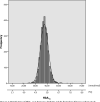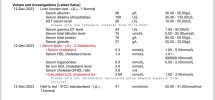According to Bilous and Donnelly, there are a few people for whom HbA1c doesn't work. There can (chapter 3) be spurious results for example where there is iron deficiency, haemoglobinopathies, renal failure, or amongst different ethnic groups.
The problem is that the alternative tests have their own issues. B&D quote the US NHANES study where 1.6% of the population had HbA1c >6.5% (>48mmol/mol) but 5% of those would have been undiagnosed by a fasting plasma glucose or an oral glucose tolerance test. FPG is said to be problematic because the subject needs to fast (and presumably there is low compliance).
Conclusion they draw is that the HbA1c isn't entirely perfect but is the best there is.
@Ian_White
You mention
As a side note, in the 3 months prior to my bloods being taken, I'd stayed off alcohol completely.
Alcohol tends to suppress blood glucose levels because in the system it interferes with the liver topping up ("trickle-charging") your blood glucose. It is possible that your liver became a bit more active doing this top-up in the three months before your last test, in the absence of alcohol.


